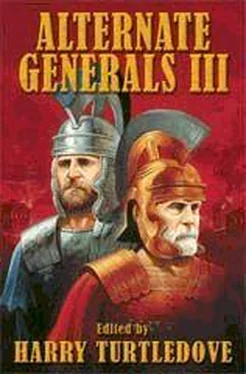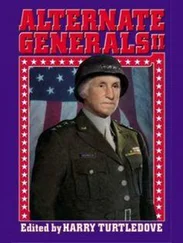Lee gave a sour smile. "My mission nears completion, then. I hoped, sir, for a cabinet meeting-and it appears that I have one now."
"Oh, I assure you this is much better. My younger brother is somewhat rashly prone to say I am the Government." Croft shrugged. "Rather, I have become a shortcut, a convenience in difficult situations."
And our Confederacy is one such , thought Lee. His arm began to ache again. He rubbed it absent-mindedly. "Let us begin down that shortcut then, shall we? Tell me, Mister… Croft. Why is it your government no longer recognizes our Confederacy?"
Croft smiled blandly. "Whatever do you mean? The British government has recognized you. Lord Palmerston did so shortly after your brilliant victory in Pennsylvania. Made a lovely little speech about it, too, about how England had its Runnymede, but the South had their General Meade."
"Your government has since done everything in its power to disavow that recognition!"
Croft fingered the black velvet curtains as he stared out the window. "Hmmm. The fog seems to be lifting somewhat. Strange how fog lifts and falls for no discernible cause." He turned to Lee. "And what reason have you been given for this supposed… intransigence by Her Majesty's government?"
"Officially? None." The British government wasn't even talking to the Confederacy enough to admit it wasn't talking. Nor enough to deny it.
"That then implies you've an 'unofficial' reply, would it not?"
As if this charade tonight wasn't. "What was passed on to us through a neutral third party-unofficially, of course-"
"Of course."
"— was the recent rapid turnovers of your government."
Croft nodded slowly. "Much truth in that, I'd dare say. Palmerston, Russell, Derby, Disraeli, and now Gladstone. We've gone through five governments in as many years. Five since your Gettysburg. Things have been rather muddled of late." He sighed. "I've found it most… tedious."
Lee snorted. "Too 'muddled' to even spend the few minutes it would to take to accept my ambassadorial credentials? Unlikely, sir. Unlikely."
Croft only smiled. "You've not met Disraeli, then. The sobriquet 'Dizzy' is no mere onomatopoeia."
"I tire of your games, sir. One would think that in staging this elaborate rendezvous, you would at last be intent on providing answers. Well, sir! Provide them!"
A moment passed as Croft looked Lee up and down, measuring him against some secret scale. "Very well," he said at last. "You wish to know why the British government is so reluctant to continue to treat with yours." He shook his head. "Hardly any cognoscitive effort is required, my dear General. One need merely speak that one singularly ugly little word."
Lee knew full well which word Croft meant. That hateful, shameful word Lee could no longer bring himself to speak.
Croft spoke it for him, all but hissing it:
"Slavery."
For the first time, the lethargic Croft showed fire, a fire in his eyes Lee was all too familiar with: He had seen it in the eyes of the Northern abolitionists before the war.
Nothing would extinguish that blaze. Nor did Lee, down in the recesses of his soul, truly wish to try. Duty, however, impelled him to. How many times would he be called on to defend the indefensible?
"May I remind you, sir," Lee said, choosing his every word carefully, "that the internal affairs of a sovereign nation, particularly one on the other side of a vast ocean, are of no concern to Britain, either to her government or to her subjects."
Yes, Lee thought. Self-determination's a principle I can defend-just as long as I do not think through that principle's ultimate personal ramifications. "And," he continued "may I also remind you that your government recognized the Confederacy despite our peculiar institution. If it was not a concern then, it should not be a concern now. Nothing has changed."
"Perhaps that lack of change is the problem," Croft shot back. "General Lee, I've read your view on the 'servile question' as your political parties refer to it in senatorial debates-"
"The South, sir, has no political parties," Lee spoke with pride. The evils Republicanism and Whiggerydom had brought were one taint, at least, from which the South had freed itself.
"My apologies." Croft smiled wider. A crocodile smile. "The factions , then, of your government's undivided whole." He fingered the curtain for a moment. "You favor a gradual emancipation-but an emancipation nonetheless. Rather more in line with your President Longstreet's views than that of the Yancy-Rhett faction controlling your senate." He let go the curtain. "Of course, not even the Charleston Mercury dares term you a 'black Republican. Not yet."
Lee knew they had started calling Longstreet that. Lee had spent his trip across the Atlantic wondering, was he being sent by Longstreet to shield Lee from the coming storm? Or by Rhett to get rid of a troublesome marble man. No matter. By now, anyway, the Louisiana crisis should have all blown over. Southern politics seemed to be the art of overreacting. "My personal views don't matter. My government's views do."
"We differ on that, too, but let it pass for now. What 'government views' would you have Whitehall know?"
"That the matter is our business, not yours."
Croft's smile was gone. "You repeat yourself," he said, his voice rising.
"Only because you won't listen the first time." Lee's voice also rose. "I cannot state the Confederacy's position strongly enough."
"The truth of an opinion doesn't depend on how strongly it is stated."
"I suggest, sir, that you then apply that maxim to yourself, because you, sir, are shouting ." And so was Lee. He took a deep, calming breath.
The carriage pulled to a stop along the banks of the Thames.
Croft grunted. "Tempers run hot. Perhaps some cool night air? I've something of interest to show you at any rate, General."
Lee had of course heard of the great Victoria Embankment project. To actually see it, even dimly through a thinning fog, was something else again.
Croft insisted they step out of the cab. He led Lee to a good vantage point on Westminster Bridge.
What game is Croft playing now? Lee imagined he'd soon find out. He was beginning to understand how McClellan must have felt.
Croft pointed out the seawall (a mile and a half long, Croft said, but Lee could see only a small length of it in the light fog) that held back the Thames five hundred feet from its natural riverbank. The exposed riverbed had then been gouged out and a strong foundation laid. Scaffolding and the beginnings of masonry walls sketched out the substructure's eventual shape. Lee could even see the track bed where the underground railroad would run.
Underground railroad , frowned Lee. Was there ever any escaping the stain of slavery?
Croft was waiting for Lee to say something. Very well. Honey words over something as innocent as this cost little. "Most impressive," Lee nodded. "I understand that when this is finished, a great boulevard will be built over this excavation. Shortly after my arrival I saw your city's other great project, Queen Victoria Street. I must say, though, that carving a street through a city is far less impressive than carving one from a mighty river."
Lee expected Croft to nod or speak or do something, but Croft still just stood there waiting.
"There is some purpose," Lee asked, "in your showing this to me?"
"Some small purpose, yes." Croft nodded. Lee did not like that smile Croft wore. "Tell me, do you know the primary purpose of this whole project? Not the street. Not the underground railroad. But the real reason for the Embankment?"
Lee shook his head.
"Sewage, General Lee. Simple, plain foul sewage. The Embankment is nothing more than a great covered sewer designed to carry waste ten miles east to Barking. As things stand now, it's all just dumped into the Thames here at this very spot. Right in Westminster. Right in the heart of Empire."
Читать дальше












